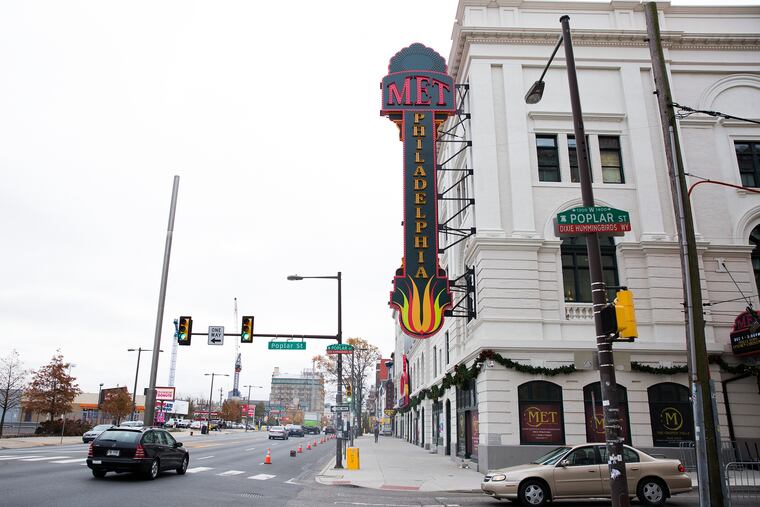Live Nation casts Met landlord’s lawsuit as ploy to earn ‘enormous additional sums’
The Beverly Hills-based entertainment giant said developer Eric Blumenfeld was trying to earn “more under the lease than what he bargained for.”

Live Nation has fired back at its landlord at the Met Philadelphia, saying in a legal filing that theater owner Eric Blumenfeld was trying to earn “more under the lease than what he bargained for” through a lawsuit that aims to lay claim to a cut of all ticket sales and half of the revenue from corporate sponsorships within the venue.
The Beverly Hills-based entertainment giant said in its preliminary objections to Blumenfeld’s legal complaint, filed late last year in Common Pleas Court, that the developer was trying to “rewrite the lease [for the North Broad Street property to] receive enormous additional sums of money.”
“The entire complaint is an attempt to extort additional rent,” Live Nation attorney Paul Rosen, of the law firm Spector Gadon Rosen Vinci PC, said Thursday.
Christopher R. Cordaro, vice president of Blumenfeld’s EB Realty Management Corp., declined to comment on the promoter’s objections, saying the filing was still being reviewed.
The Metropolitan Opera House, on Broad Street near Girard Avenue, was built in 1908 by impresario Oscar Hammerstein as a hoped-for North Philadelphia counterpoint to the Academy of Music, south of City Hall.
The Rev. Mark Hatcher, who has been holding services at the property for decades as head pastor of the nondenominational Holy Ghost Church, bought the then-deteriorating building in the mid-1990s.
Hatcher teamed up with Blumenfeld, whose other area projects have included the restoration of the Divine Lorraine Hotel into apartments, to renovate the Met building in 2013 into a $58 million concert hall, with the developer acquiring a controlling stake in the property.
Live Nation signed a lease adding the location to its portfolio of Philadelphia-area venues in April 2017. Others include the Fillmore in Fishtown, the Theatre of Living Arts on South Street, the Tower Theater in Upper Darby, and BB&T Pavilion in Camden.
In his complaint against Live Nation, Blumenfeld said the promoter violated its lease, shirking an agreement to pay him at least $2 for every ticket sold at the Met on top of its base rent of $1.5 million a year by arbitrarily defining some performances — including ones by Madonna, Phish, and Sting — as “private” or “licensing agreement events.”
Live Nation said in its response that Blumenfeld had not been owed extra for those events, which were held under the promoter’s “right to license the premises for entertainment.” “Entities other than Live Nation are not subject to ... requirements relating to payment ... of percentage rent,” it said.
Blumenfeld also accused Live Nation of violating a lease provision that granted him half of all revenue from corporate branding deals at the concert hall. Accompanying the lawsuit were copies of emails from Live Nation executives saying that beverage-sale sponsorships and naming rights to sections of the venue’s interior qualified for revenue-sharing.
Live Nation responded, however, that Blumenfeld was owed sponsorship revenue from naming deals only “for the entirety of the premises” under its lease. The emails included with Blumenfeld’s lawsuit were “representations that are not reflected or contained” in the rental agreement, it said.
Holy Ghost Church joined Blumenfeld’s suit, alleging that Live Nation had broken an agreement to let it continue holding Sunday services in the renovated building and that it had treated “the church and its congregation disrespectfully.”
In its preliminary objections, the concert promoter acknowledged those allegations but did not respond to them. Live Nation attorney Rosen said that had been deliberate.
“We have nothing about the reverend to say that would ever be disparaging,” he said. “He’s a considerable asset to Live Nation and its future.”
Hatcher stopped short of saying he planned to withdraw his church from the lawsuit but said the congregation now has a good relationship with Live Nation.
As an example, he singled out a recent collaboration with company executives and members of R&B group Boyz II Men to announce a $110,000 donation to fund music education at Philadelphia public schools.
The church’s problems raised in the lawsuit were “kinks that needed to be worked out,” he said. “I’ve always felt we should be able to sit down and talk these little things out on a personal note.”